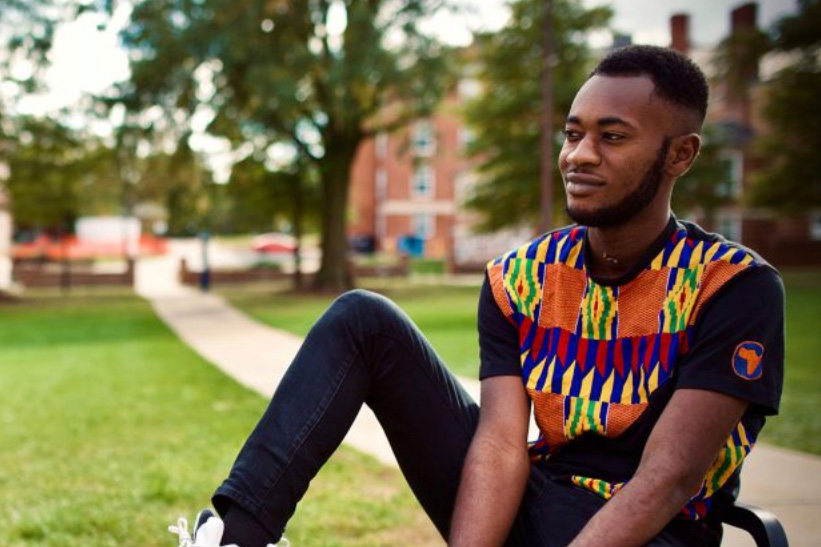Growing up, Herbert Obeng never took things to heart. Teasing in school was brushed off and resolved with a laugh, chalked up to the usual Ghanaian humor-driven dialogue that made light of the hardships in life.
It wasn’t until October 2022 — four years after he moved to the United States from a small city in Ghana’s Ashanti region called Obuasi — that he truly struggled with his mental health. He felt like his life was paused after the death of his father.
“Everything I have going on, I’m trying to do that to make my parents proud,” Obeng said. “So for this to happen to me, where do I go next?”
Obeng isolated himself in his room and eventually dropped his classes at the University of Maryland.
Because he withdrew from classes after the course drop deadline in September, Obeng wasn’t eligible for a refund. Left devastated that he would have to repay for classes without reaping the knowledge of the courses he invested in, Obeng enrolled in classes at Montgomery College this semester and plans to return to this university next fall and graduate the following spring.
Throughout this time, Obeng turned to friends for support and prayer, asking for God’s help to move on with his life, he said. Prayer and other religious practices are commonly used in Ghana alongside community support to help people through difficult times.
Community and family-based support in Ghana is a hallmark of social life and an indirect preventive measure against poor mental health, according to Samuel Adjorlolo, the mental health nursing department head at the University of Ghana. This support is rooted in a national sense of resilience built up to shield residents from daily socioeconomic struggles.
High energy costs, government debt, low agricultural productivity, limited private sector growth and regional trade barriers challenge long-term economic growth in Ghana despite its fast-growing economy, according to the U.S. Agency for International Development.
[Mental health stories beyond UMD: International students discuss mental health experiences]
The COVID-19 pandemic furthered these challenges in 2020, according to a report from the BTI Transformation Index.
This unstable economy lowers job availability, which leaves families struggling to afford living expenses, Obeng said.
Nevertheless, strong social networks enable residents to share their burdens and rely on others during troubling times.
Family, neighbors and strangers look after one another, Adjorlolo said, with people calling to check on friends they haven’t heard from in a day or two.
Humor is also a key element of socialization that helps distract and relieve Ghanaians from surrounding socioeconomic plight. Families and social circles crack jokes at others’ expense in a type of “rotational system of teasing,” Adjorlolo said.
Obeng and his friend Abena Gyasi used to banter about each others’ favorite soccer teams, exchanging jabs about whose team would win. Gyasi also believes family dynamics at home built up her emotional resilience from a young age.
Gyasi, a recent university graduate living in Obuasi, said like many families in Ghana, her parents believe in the “spare the rod to spoil the child” principle, wherein her parents spanked, insulted or confiscated something to discipline her.
“My parents use this method of not buying you something you want to have when you don’t do well academically,” Gyasi said in a WhatsApp message. “When I am performing badly, they pay for home tutoring sessions after school for me to help me get better.”
In college, however, this academic pressure resulted in anxiety and bouts of depression, which turned Gyasi to Bible scriptures and prayer for emotional and spiritual encouragement.
With more than 70 percent of Ghana’s population practicing Christianity, spiritual or religious means of treating mental health struggles are popular. Whether experiencing the loss of employment or the loss of a family member, people commonly use the saying “give it to God” to express relief from worry.
Much of the country also subscribes to the doctrine of demonology, wherein mental health issues are a product of demonic or evil forces, Adjorlolo said. As a result, many first steps for seeking help are sought through churches, herbalists and occasionally extreme torture practices used to coax a spirit out of someone’s body, such as chaining a person outside to expose them to the sun and other earthly elements.
The presence of these traditional practices makes conversations about formal mental health treatment more difficult.
[Mental health stigma in India causes delays in intervention and treatment]
For Adjorlolo and other mental health care physicians, the larger challenge is merging conversations about tradition and formal means of treatment to destigmatize diagnosis, medication and other treatments.
“Whilst you go for prayers, you do whatever practice you have to do, there’s also a medication that can supplement the process,” Adjorlolo said. “We’re not going to discourage them … because they’re also serving a [spiritual] purpose … the best we can do is to try to work with these guys to appeal to them.”
Meanwhile, efforts are underway to decentralize mental health care to provide access to basic mental health support at primary health care facilities. There are only three psychiatric hospitals in Ghana for its nearly 33 million people, and all facilities are in large southern urban centers, according to Adjorlolo. The lack of government funding also means mental health services are largely driven by donors such as the U.S. and U.K. international aid agencies, which burdens facilities trying to balance responsibilities to donors with duties to clients.
Nevertheless, the power of the community and the potential one has for a positive impact has helped Obeng maintain his mental health during hard times.
Obeng and Gyasi manage a nonprofit called the Flute Charity Foundation to help fund orphanages, hospitals and homeless shelters in the U.S. and Ghana.
“We want to be the change that the world wants to see, we want to be the ones to put smiles on the people who have lost hope in their life,” Obeng said. “For them to know that there is hope for them, and the world has not come to an end.”



